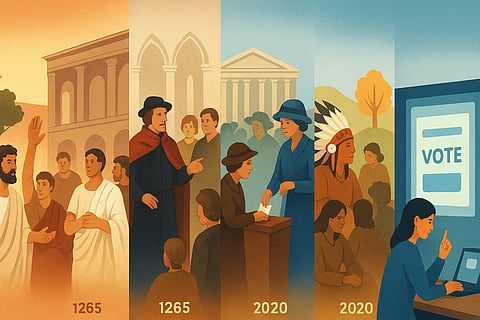
- Home
- NewsGram USA
- India
- न्यूजग्राम
- World
- Politics
- Entertainment
- Culture
- Lifestyle
- Economy
- Sports
- Sp. Coverage
- Misc.
- NewsGram Exclusive
- Jobs / Internships

The evolution of democracy began with ancient Athens’ direct assemblies and Rome’s blend of direct and representative rule, later shaping democratic traditions worldwide.
Key milestones like women’s suffrage after World War I and the continued practice of direct democracy by the Crow Nation highlight how democracy has been redefined.
In the digital age, innovations such as Estonia’s online voting and India’s MyGov platform show how technology is reshaping the evolution of democracy, making it more accessible yet also facing new challenges.
Democracy is not just a system of government but humanity’s ongoing conversation about freedom, fairness, and the right to be heard. It wasn’t born in a perfect form or in a single moment. Instead, it has gradually taken shape to adapt to the needs of different cultures and times. From outdoor discussions in classical Athens to online forums in the twenty-first century, the evolution of democracy reflects people’s constant struggle for a say in important decisions.
England witnessed something extraordinary in 1265 CE. A rebellious nobleman Simon de Montfort convened an assembly that included both the aristocrats and the knights and commoners for the first time ever. This assembly is often marked as the birth of the English Parliament.
It must have seemed revolutionary for the common people who were present in the chamber. They were no longer just silent subjects to the crown but were now involved in governance. Even though it was fragile and brief, the moment laid the foundation for parliamentary democracy, a tradition that still shapes the evolution of democracy around the globe.
Centuries later, democracy had to redefine itself yet again. World war I marked a turning point both on the battlefield and at home. While men were away fighting in the war, women kept societies running by managing industries, farms and families. Thereafter, making their sacrifices impossible to ignore.
This led to women being granted the right to vote in the UK and Germany in 1918 and secured women’s suffrage in 1920 when the United States ratified the 19th Amendment - the right of citizens of the United States to vote shall not be denied or abridged by the United States or by any State on account of sex. These victories changed the course of democracy, making it more inclusive and representative of the people it claimed to serve. In view of all this, India’s case is unique when it comes to democracy as every citizen were granted the right to vote, be it women or anyone from the marginalized, from the very first election after independence in 1947.
In the 5th century BCE, Athens gave the world a bold governance experiment, long before parliaments and the right to vote. Free male citizens gathered in assemblies to debate, vote on laws and shape public policy directly here.
It was far from being perfect as women, slaves and foreigners were not allowed but the idea that political power could come from citizens rather than monarchs was revolutionary. Despite the idea being born in a small city-state, the concept served as the foundation for the evolution of democracy and served as an inspiration to nations for centuries.
Rome’s Republic showed how democracy could develop with an expanding society whereas Athens gave us a glimpse of direct democracy. In 509 BCE, Roman citizens began voting in assemblies but also elected senators to represent them striking a balance between direct and indirect rule.
This system lasted for centuries and influenced the way succeeding societies structured their governments. Later, Rome's experiment served as a model to the modern nations like the United States and France while drafting their constitution, proving its importance in the evolution of democracy.
The story of democracy does not specifically belong to Europe. The practice of direct democracy is still alive among the Crow Nation of North America. Collective discussions are conducted to make decisions, with the community working together to come to an agreement.
For the Crow people, democracy is a way of life and not just a political slogan. Their councils prove that presidents and parliaments are not always a requirement for democracy. At times, it is as simple and profound as a group of people gathered in a circle, adding another chapter to the continuous evolution of democracy.
Today, democracy is traversing into a new frontier of the digital age. Estonia went on to become the first nation to conduct a nationwide online voting in 2005. When it comes to India, platforms such as MyGov invite citizens to directly influence policies. People also have fresh ways like digital forums, petitions and social media to interact with their governments.
These advances naturally come with challenges such as cybersecurity threats, misinformation and disparities in internet access. However, they also hold the potential to increase inclusivity in the evolution of democracy by overcoming geographical barriers and providing a platform for more voices to be heard in real time.
When viewed through the lens of history, democracy appears as a lengthy discussion rather than a straight line. Every generation has reshaped the meaning of democracy, from the Athenians' agora debates to the Romans' balancing of assemblies and senates, from English commoners entering parliament to women demanding the right to vote, from the Crow Nation's community councils to today's digital platforms.
These stories of every era are tied together in a simple reality, that is, the desire to be heard. The development of democracy, whether in online platforms, wooden halls, or stone assemblies, remains to be humanity's response to that pressing need. [Rh/SY]
Also Read:
